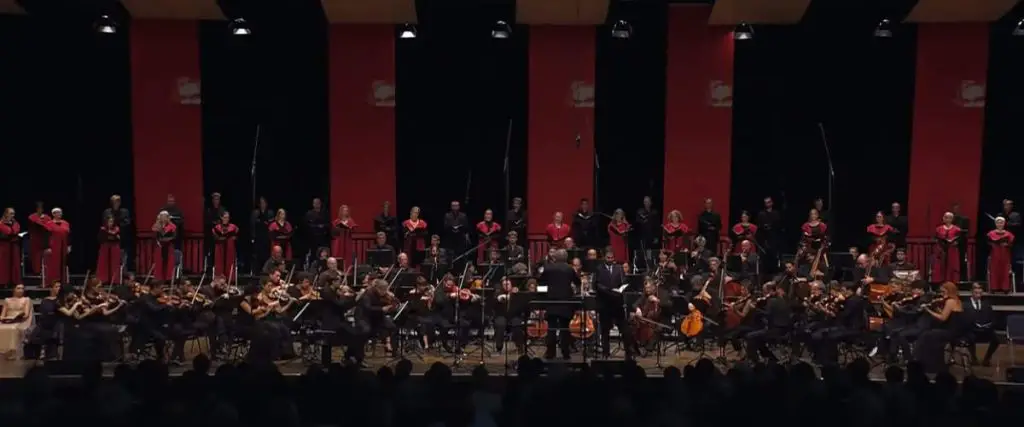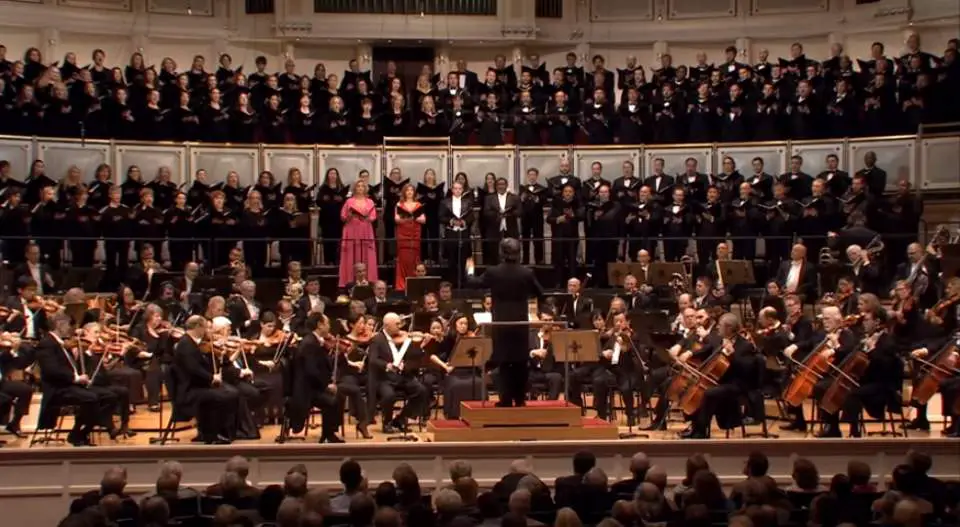A legendary recording of Ludwig van Beethoven’s Symphony No. 9 in D minor, Op 125, “Choral”: Bayreuth Festival Orchestra and Chorus conducted by Wilhelm Furtwängler who is widely considered to be one of the greatest symphonic and operatic conductors of the 20th century. Recorded live on July 29. 1951 at the Bayreuth Festival. Sami Habra, a British specialist in classical music born in 1935 in Haifa wrote regarding this very famous concert: “Yet, after the war, he had to prove to the World that German musical Art had indeed survived that fateful period as well as some attempts by the Allies to ignore or undermine German culture. The whole musical world retained its breath while Beethoven was universally re-born when Furtwängler conducted the Ninth for the re-opening of Bayreuth in 1951” (Sami Habra, CD Furtwängler, Beethoven’s Choral Symphony, Tahra FURT 1101–1104, p. 19.)
Soloists:
- Elisabeth Schwarzkopf, soprano
- Elisabeth Höngen, alto
- Hans Hopf, tenor
- Otto Edelmann, bass
When the Compact Disc Digital Audio standard came out in 1980, there was a curious fact about it: It was 74 minutes long. Not 60 minutes. Or even 70 minutes. Seventy-four. According to Philips, the “longest known performance [of Beethoven’s Symphony No. 9] lasted 74 minutes, a mono recording made during the Bayreuther Festspiele (Bayreuth Festival) in 1951 and conducted by Wilhelm Furtwängler.” 60 minutes wouldn’t cut it, so it became 74 minutes.
Beethoven’s Symphony No. 9
The Symphony No. 9 in D minor, Op. 125 (sometimes known simply as “the Choral”), is the final complete symphony of Ludwig van Beethoven (17 December 1770-26 March 1827). Completed in 1824, the symphony is one of the best-known works of classical music repertoire. Among critics, it is almost universally considered to be among Beethoven’s greatest works and is considered by some to be the greatest piece of music ever written.

It is in four movements:
- Allegro ma non troppo, un poco maestoso
- Scherzo: Molto vivace – Presto
- Adagio molto e cantabile – Andante moderato – Tempo primo – Andante moderato – Adagio – Lo stesso tempo
- Recitative: (Presto – Allegro ma non troppo – Vivace – Adagio cantabile – Allegro assai – Presto: O Freunde) – Allegro molto assai: Freude, schöner Götterfunken – Alla marcia – Allegro assai vivace: Froh, wie seine Sonnen – Andante maestoso: Seid umschlungen, Millionen! – Adagio ma non troppo, ma divoto: Ihr, stürzt nieder – Allegro energico, sempre ben marcato: (Freude, schöner Götterfunken – Seid umschlungen, Millionen!) – Allegro ma non tanto: Freude, Tochter aus Elysium! – Prestissimo, Maestoso, Molto prestissimo: Seid umschlungen, Millionen!
Lyrics of the fourth movement
German
O Freunde, nicht diese Töne!
Sondern lasst uns angenehmere anstimmen,
und freudenvollere.
Freude!
Freude, schöner Götterfunken
Tochter aus Elysium,
Wir betreten feuertrunken,
Himmlische, dein Heiligtum!
Deine Zauber binden wieder
Was die Mode streng geteilt;
Alle Menschen werden Brüder,
Wo dein sanfter Flügel weilt.
Wem der große Wurf gelungen,
Eines Freundes Freund zu sein;
Wer ein holdes Weib errungen,
Mische seinen Jubel ein!
Ja, wer auch nur eine Seele
Sein nennt auf dem Erdenrund!
Und wer’s nie gekonnt, der stehle
Weinend sich aus diesem Bund!
Freude trinken alle Wesen
An den Brüsten der Natur;
Alle Guten, alle Bösen
Folgen ihrer Rosenspur.
Küsse gab sie uns und Reben,
Einen Freund, geprüft im Tod;
Wollust ward dem Wurm gegeben,
Und der Cherub steht vor Gott.
Froh, wie seine Sonnen fliegen
Durch des Himmels prächt’gen Plan,
Laufet, Brüder, eure Bahn,
Freudig, wie ein Held zum Siegen.
Seid umschlungen, Millionen!
Diesen Kuss der ganzen Welt!
Brüder, über’m Sternenzelt
Muss ein lieber Vater wohnen.
Ihr stürzt nieder, Millionen?
Ahnest du den Schöpfer, Welt?
Such’ ihn über’m Sternenzelt!
Über Sternen muss er wohnen.
English Translation
Oh friends, not these sounds!
Let us instead strike up more pleasing
and more joyful ones!
Joy!
Joy, beautiful spark of divinity,
Daughter from Elysium,
We enter, burning with fervour,
heavenly being, your sanctuary!
Your magic brings together
what fashion has sternly divided.
All men shall become brothers,
wherever your gentle wings hover.
Whoever has been lucky enough
to become a friend to a friend,
Whoever has found a beloved wife,
let him join our songs of praise!
Yes, and anyone who can call one soul
his own on this earth!
Any who cannot, let them slink away
from this gathering in tears!
Every creature drinks in joy
at nature’s breast;
Good and Bad alike
follow her trail of roses.
She gives us kisses and wine,
a true friend, even in death;
Even the worm was given desire,
and the cherub stands before God.
Gladly, just as His suns hurtle
through the glorious universe,
So you, brothers, should run your course,
joyfully, like a conquering hero.
Be embraced, you millions!
This kiss is for the whole world!
Brothers, above the canopy of stars
must dwell a loving father.
Do you bow down before Him, you millions?
Do you sense your Creator, o world?
Seek Him above the canopy of stars!
He must dwell beyond the stars.
Sources
- Wilhelm Furtwängler on Wikipedia
- Why Is the CD 74 Minutes Long? on gizmodo.com
- Symphony No. 9 (Beethoven) on Wikipedia
